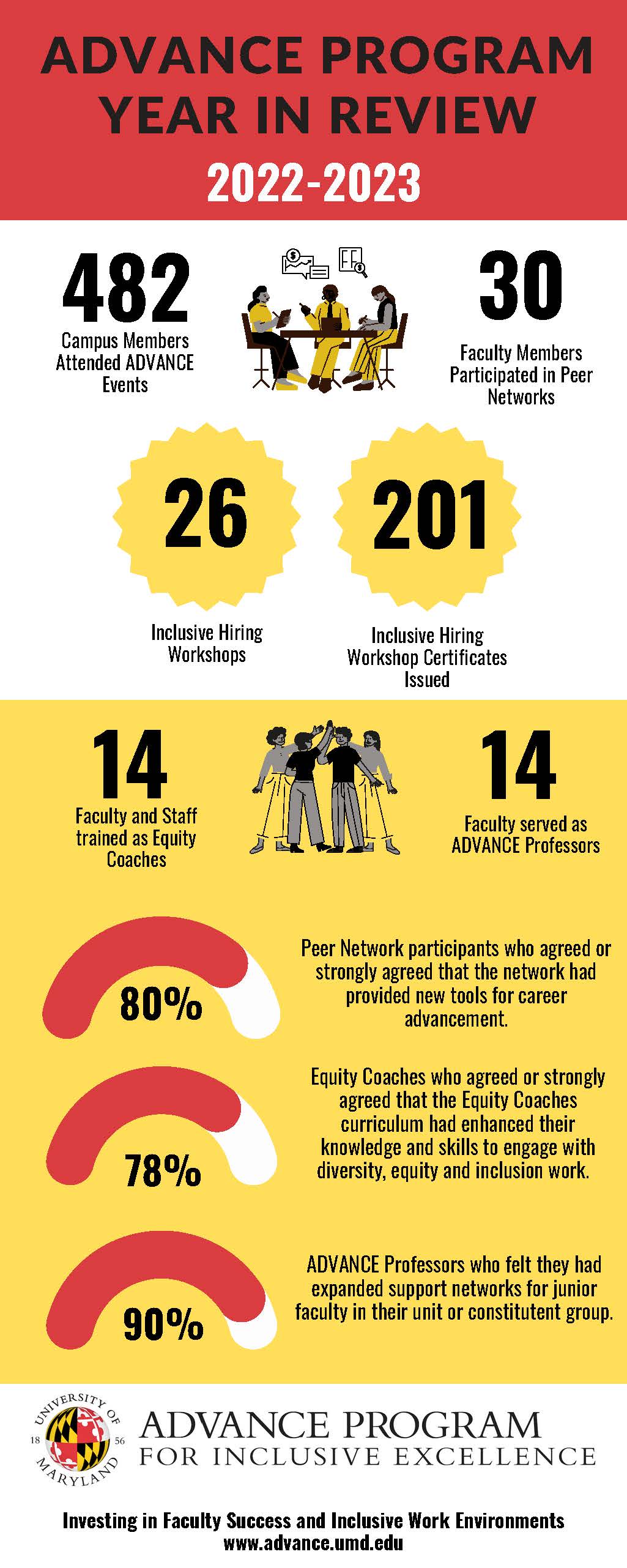Since 2010, the ADVANCE Program has a proven track record of enhancing the climate for faculty professional growth. Examples of our impact include the following:
Representation
- Growth in the percentage of women TTK faculty. The overall percentage of TTK women faculty increased from 31% to 37% in 2023. This includes an increase at each rank (assistant, associate, and full), with the greatest growth in the percentage of women associate professors.
- Modest growth in the percentage of faculty of color. The overall percentage TTK Black, Latinx, and Indigenous faculty increased from 9% to 13% in 2023. The representation of Black faculty increased from 5% to 7%; the representation of Latinx faculty increased from 3% to 6%; the representation of Indigenous faculty remained the same; and Asian faculty increased from 13% to 16%.
Faculty Development
- 655 faculty have participated in ADVANCE peer networks since 2010.
- Cohort analysis from 2010-2017 showed that participating in core ADVANCE programs decreased the odds of TTK faculty leaving UMD by 80.2%. From 2010-2017, 6.1% of TTK faculty who participated in peer networks left the university, compared to 17.9% of TTK non-participants.
- Cohort analysis also showed that TTK faculty that participated in core ADVANCE programs were more likely to be promoted compared to non-participants.
- Faculty who participate in peer networks report greater awareness about the requirements, standards, and review process for tenure and/or promotion; greater connections with faculty across campus; and enhanced tools to leverage for career advancement.
- Many faculty members that have participated in ADVANCE programs have gone to leadership positions across the campus, including as deans, associate deans, and within the provost’s office.
- In addition to peer networks for women and faculty of color, ADVANCE initiated a peer network for PTK faculty, which was the first program on campus focused on PTK professional development. ADVANCE also initiated a leadership development program open to all faculty members and a leadership development program specifically for PTK women, both of which were unique in their focus.
Education and Training
- Led efforts to increase the uptake of inclusive faculty hiring practices. Since 2020, 201 faculty members have completed the Inclusive Hiring Workshop. Faculty who participated in the workshop indicated that it improved their understanding of the ways bias shapes faculty hiring and increased awareness of strategies that they could use to mitigate bias in hiring.
- Trained 20 faculty and staff to be Equity Coaches, who facilitate cross-campus workshops on inclusive hiring.
- Trained 26 academic units (~500 faculty, staff, and students) in being “active bystanders against bias.” Participants who completed the workshop report higher awareness of bias and increased comfort in intervening when they see/observe bias.
Advocacy and Advising
- Supported the creation of the faculty parental leave policy (2012); facilitated faculty awareness and helped faculty navigate the policy.
- Supported the creation of the PTK promotion policy (2015)
- Based on empirical research, provided feedback and advocacy on behalf of faculty during the COVID-19 pandemic, including advocating for the inclusion of “personal contexts” in the pandemic impact statement.
- Designed and provided feedback on the FAMILE hiring process (2021).
- Provided strategic advice on the dual-career hiring policy (2023).
Research and Evaluation
- Faculty affiliated with the ADVANCE program have contributed to multiple NSF-funded projects focused on diversity, equity, and inclusion in the academic work environment, including research on faculty hiring, workload, and readiness for transformative change.
These results have been reported in the following publications:
- Culpepper, D., Lui, B.F., & O’Meara, K. (in-press). Building an infrastructure for mid-career faculty advancement: Lessons learned from faculty peer networks in the UMD ADVANCE Program. In Baker, V., Tersoky, A., & Lunsford, L. (Eds), A Toolkit for Mid-Career Academics: Cultivating Career Advancement. Routledge.
- Culpepper, D., & Kilmer, S. (2022). Faculty-Related COVID-19 Policies and Practices at Top-Ranked Higher Education Institutions in the United States. ADVANCE Journal, 3(2).
- O’Meara, K., Nyunt, G., Templeton, L., & Kuvaeva, A. (2019). Meeting to transgress: The role of faculty learning communities in shaping more inclusive organizational cultures. Equality, Diversity and Inclusion: An International Journal, 38(3), 286-304.
- O’Meara, K., & Stromquist, N. P. (2016). Faculty peer networks: Role and relevance in advancing agency and gender equity. In Globalised re/gendering of the academy and leadership (pp. 150-170). Routledge.
